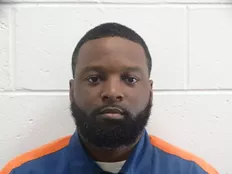
Steve Neavling
Suspects and witnesses were rounded up and interrogated at the then-headquarters of the Detroit Police Department at 1300 Beaubien in downtown. The building was used by DPD until 2013.
Family members of Black men who are still behind bars after a disgraced Detroit detective was accused of mishandling their investigations are incensed that Wayne County Prosecutor Kym Worthy has so far declined to review criminal cases.
Detective Barbara Simon was featured in a two-part Metro Times series that showed how she confined young suspects and witnesses to small rooms at police headquarters without a warrant and elicited false confessions and witness statements that were later recanted. Judges and attorneys have condemned the detective’s tactics, which so far have led to four exonerations.
After the series was published last month, Detroit police have offered to help Worthy’s office review the cases from the 1990s and early 2000s, but the longtime prosecutor has balked at reexamining Simon’s tactics to determine if more innocent men are still in prison.
Simon was known as “the closer” because of her knack of gaining confessions and witness statements.
Detroit police commissioners are also calling on a comprehensive review of all of Simon’s cases.
Multiple imprisoned people say they either falsely confessed or were convicted based on witness statements that were obtained by Simon through coercion. Some of them have been in prison for more than 20 years.
In a statement to Metro Times last week, Worthy said she doesn’t have enough information to proceed.
But the series clearly showed how the tactics that Simon used in the exoneration cases were similar to those used against men still in prison.
Deonte Howard was only 16 years old when he was charged with murdering 19-year-old Tyrone Simpson in front of a convenience store on Tireman Street in April 2010. Two witnesses have since said Howard was not the gunman, and a third said Simon threatened him if he didn’t incriminate Howard.
Howard’s first trial ended in a hung jury before he was convicted following a second trial. Howard alleges Simon coerced witnesses to incriminate him.
Howard’s sister, Tio’sha Martin, says she was devastated when Worthy said she wasn’t reexamining her brother’s case.
“It actually broke my heart,” Martin tells Metro Times. “Nothing is being done about it after 14 years. No one would charge him in today’s world. I feel like it was very unfair. He was 16 years old. He was a very loving boy. Our entire family loves Deonte. What they’re accusing him of is not Deonte at all.”
She adds, “We know he’s innocent, and for them not to review his case, it’s really heartbreaking.”
For 22 years, Terrill Johnson says he’s been in prison for a crime he didn’t commit. He was 17 years old when police apprehended him, his 19-year-old sister, and his mother without a warrant. They were separated and interrogated for hours at the department’s headquarters without access to an attorney, they said.
Even though Johnson was still a juvenile, police refused to let him speak with his mother. Because of Simon’s coercive tactics, he said, he eventually caved in and was “willing to do whatever she wants me to do so she leaves me alone.”
He says he falsely confessed and was sentenced to life in prison.
His mother, Clara Johnson, is frustrated and angry because she’s convinced her son is innocent. She can’t understand why Worthy’s office won’t review her son’s case because it’s so similar to others that have led to exonerations.
“We have been through utter hell,” Johnson says. “We’re fed up, and we’re tired. They do what they want because they have no repercussions.”
Prison has been difficult for her son. He says prison officials ignored him when he had overwhelming back pain. He eventually had to have back surgery. Now he needs medical attention again.
“I’m at my wits end,” she says. “My son is sick. I don’t know what’s wrong with him. He’s bleeding inside. Is it an emergency to them? No.”
Nathan Peterson also found himself face to face with Simon in February 2000, and like the others, he says she threatened him, claimed she had evidence that didn’t exist, and promised to set him free if he confessed.
He was accused of fatally shooting a man.
“I was ready to get out of there, and I was willing to do anything,” he says of the interrogation.
Like Howard, his first trial ended in a hung jury in July 20o1. But he says police and prosecutors changed the narrative of the shooting during the second trial, and he was convicted of murder and sentenced to life in prison.
His cousin Yolanda Garrison, who was raised in the same house as Peterson, has never given up on freeing him. She says he was a sweet kid, and the pair often rode bikes and played basketball together after school.
Peterson had two young children at the time, including one who was born when he was in jail.
“When we heard they were accusing him of this, it was mind-blowing because it’s something he could never do,” Garrison says. “It hurt his mom the most. To see her hurting and see what she was going through, it was tearing us up inside. We told her it was going to be alright and he’s going to be fine and come home. We didn’t think he’d go to jail.”
While in prison, Peterson’s mother, grandmother, uncle, and a couple of aunts died. He wasn’t allowed to go to the funerals.
“It tore him apart,” Garrison says. “Nathan has suffered terribly for being locked up for something he hasn’t done, and he lost so many family members while behind bars.”
His family has struggled financially while hiring attorneys to help him get out of prison.
“We did everything we could,” Garrison says. “It has been a stretch and a struggle.”
Garrison hopes the prosecutor’s office or a judge will review his case and those of others who say they have been victimized by Simon.
In 1999, at the height of a misconduct scandal in the Detroit Homicide Division, Damon Smith found himself in front of Simon for an interrogation. Police alleged that he, his brother, and two friends were looking for revenge and confronted the victim with a gun and baseball bat.
He says Simon threatened to “make me the shooter” if he didn’t tell her who fatally shot a man in Detroit. He denied involvement, he says, and as a result was accused of pulling the trigger.
After the trial, Smith’s brother, Patrick Roberts, who was a prosecution witness, later recanted in a letter, saying Smith was not involved in the shooting. The actual culprits were two friends of one of the other prosecution witnesses, Roberts said.
Despite the new information and the increasing allegations of misconduct against Simon, courts have denied Smith’s appeals, and prosecutors have fought to keep him in prison.
His niece, Ochga Smith, says she’s “frustrated with the prosecutor’s office.”
“It seems like no one wants to take accountability or responsibility for any of the errors that were made,” she tells Metro Times. “They can’t forget that people’s lives are still at stake. It’s sad.”
But Smith isn’t giving up.
“I don’t think the [Metro Times] article being put out is going to be enough,” she says. “People have to continue to push and push so the actual narrative is understood. You can’t let the story blow over.”
The families credit Mark Craighead with reviving their hopes that their relatives will be freed. Craighead was exonerated of murder in 2022 after it was proven that he falsely confessed while undergoing hours of Simon’s threats and interrogations.
A year earlier, Wayne County Circuit Court Shannon Walker granted Craighead a new trial, saying Simon “has a history of falsifying confessions and lying under oath” and that Craighead’s cases demonstrated “a common scheme of misconduct.”
“Not only has this Court already found statements obtained by Simon not to be credible, but so too has the Michigan Supreme Court,” Walker said.
“This impeachment evidence demonstrates that Simon has repeatedly lied as part of her misconduct, which would allow a jury to evaluate whether to trust her testimony in light of information demonstrating a character of truthfulness,” Walker added.
Despite the judge’s strong rebuke of Simon, others who say they have been victimized by the detective have gotten no help from the prosecutor’s office. But Craighead has helped them navigate the complicated legal system and has become an outspoken advocate for the inmates.
“There are a lot of innocent people still in prison because of Barbara Simon,” Craighead tells Metro Times. “They deserve to be heard.”





